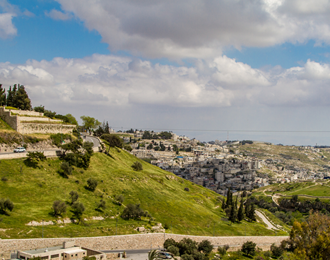Hell, a godless invention?!
24-04-2025 - Posted by Geert-JanOriginally posted on September 06, 2023 – by Andre Piet
Lately, “hell” has been a hot topic in the Christian press. Theologian Arnold Huijgen recently devoted his inauguration to it. We speak too little about it, he believes, and it should be addressed more often in sermons. The ND (Nederlands Dagblad, Dutch Newspaper) recently asked several pastors how they deal with this subject in their churches. As with Huijgen, they too appear to be uneasy with it. It is said in several responses that Jesus spoke about “hell” more than anyone else and warned against it. But what and where and how “hell” actually is, remains nowhere clear or concrete. That is tragic, for this lack of clarity is not due to Scripture. Let’s lay out the facts.
No hell but Gehenna
In the Statenvertaling (Dutch Bible translation), the word “hell” is used to translate two completely different Greek words: hades (= the realm of the dead, Hebr. she-ol) and gehenna. This is very confusing for the Bible reader, as it gives the impression that it concerns a single concept. The NBG51 (Dutch Bible translation) corrected this confusion by using “hell” exclusively to translate gehenna. In the NBV (Dutch Bible translation), the word “hell” has disappeared altogether, as the translators simply left the word untranslated. The latter is perhaps the best choice, since gehenna is a place name, and such names are generally left untranslated. At most, they are transliterated: Jeroesjalajim becomes Jerusalem in Dutch, Chevron becomes Hebron, and so on. In fact, gehenna itself is the Greek transliteration of the Hebrew Gai Hinnom, which means “Valley of Hinnom.” Jesus never spoke about hell, but consistently about Gehenna. His listeners understood all too well that He was referring to the infamous valley southwest of the city of Jerusalem. With Him, there is certainly no vagueness about “hell”: His listeners could have walked there themselves — literally.
Child sacrifices
The reason Gehenna is such an infamous valley is explained extensively in the Hebrew Bible (our “Old Testament”). Two godless kings from the house of Judah, Ahaz and Manasseh, made children pass through the fire in this valley (2 Chron.28:3; 33:6; Jer.7:31). This horrific practice, copied from the surrounding nations, was evil in the eyes of YAHWEH. According to the prophet Jeremiah, it was precisely this practice that became the cause of Jerusalem’s destruction (Jer.19:1–8).
A blasphemous concept
The infamous reputation of Gehenna is based on the fact that Israelites performed ritual child sacrifice by fire in that place. This practice is considered the ultimate form of godlessness. Repeatedly it is said that such an idea never entered God’s heart (Jer.7:31; 19:5). Let that sink in. Because what Christian theology has done is transform Gehenna into a “hell” in which God Himself performs the horrific acts He explicitly condemns as wicked evil. In other words: the most gruesome practice ever has been projected onto God Himself! And that, no less, “for eternity.” That last notion is a matter in itself, but here I will suffice with the observation that “eternity” in Scripture (Gr. aion) refers to a world-age with both a beginning and an end (“before the eons,” “consummation of the eons,” etc.). “Eternal” in the Bible does not mean endless, but is related to the age, the aeon.
Gehenna in the future
When Jesus speaks of Gehenna, He refers, among other things, to the last verse of the book of Isaiah. There we read about the future kingdom of peace, in which the nations will go up to Jerusalem and will also pass by the place where the unburied corpses of godless men lie. It is meant as a warning — God is not to be mocked. According to the prophets, Gehenna will again play a role in the future, and it will even be holy to YAHWEH (Jer.31:40). Jesus’ addition in Mark 9:48 about Gehenna, “where their worm is not deceasing and the fire is not going out,” is persistently misinterpreted. With this remark, He refers to Isaiah 66:24, where it speaks of a place of burning near Jerusalem where corpses are decomposing. That is indeed a rather macabre sight, but something entirely different from what the Christian tradition has made of it: an underground realm where souls are tortured. In the original text of Mark 9:48, it does not say that the fire is inextinguishable, but that it is not being extinguished. That is something quite different. And that “their worm is not dying” does not mean that these people are not dying, but that the maggots consuming them are not dying. Maggots do not die, in fact, but pupate. In short, the common concept of “hell” stands in complete contrast to what Scripture teaches about Gehenna.
Hell versus judgment
The Bible is perfectly clear that God judges and executes judgment. And He does so not always gently. Think of the flood, or of Sodom and Gomorrah. But take note: God’s judgments are relatively short-lived. Psalm 30:5 says, “For there is a moment in His anger; a lifetime in His benevolence.” God sets things right — precisely what the word “judgment” means. That process can be extremely painful, but it always aims at restoration. God does not punish for punishment’s sake, but to set right and to bring correction. God’s judgments are therefore always an expression of His love and faithfulness. He does not forsake the works of His hands. That is why there is no greater caricature of the God of the Bible than the doctrine of hell.

 English Blog
English Blog